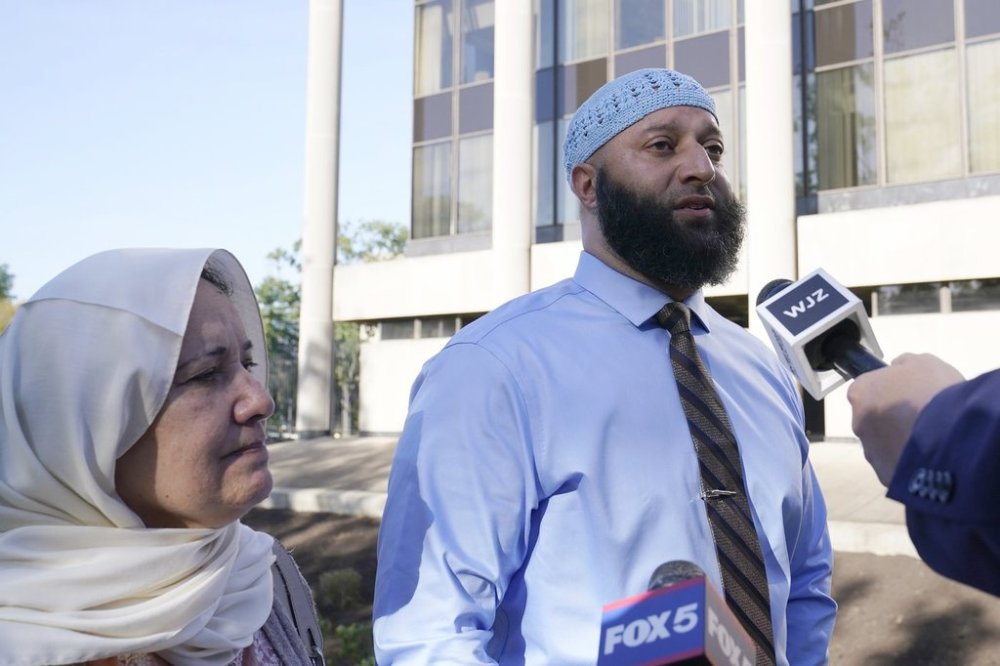Judge formally sentences Adnan Syed to time served in ‘Serial’ podcast case
Advertisement
Read this article for free:
or
Already have an account? Log in here »
To continue reading, please subscribe:
Monthly Digital Subscription
$0 for the first 4 weeks*
- Enjoy unlimited reading on winnipegfreepress.com
- Read the E-Edition, our digital replica newspaper
- Access News Break, our award-winning app
- Play interactive puzzles
*No charge for 4 weeks then price increases to the regular rate of $19.95 plus GST every four weeks. Offer available to new and qualified returning subscribers only. Cancel any time.
Monthly Digital Subscription
$4.99/week*
- Enjoy unlimited reading on winnipegfreepress.com
- Read the E-Edition, our digital replica newspaper
- Access News Break, our award-winning app
- Play interactive puzzles
*Billed as $19.95 plus GST every four weeks. Cancel any time.
To continue reading, please subscribe:
Add Free Press access to your Brandon Sun subscription for only an additional
$1 for the first 4 weeks*
*Your next subscription payment will increase by $1.00 and you will be charged $16.99 plus GST for four weeks. After four weeks, your payment will increase to $23.99 plus GST every four weeks.
Read unlimited articles for free today:
or
Already have an account? Log in here »
Hey there, time traveller!
This article was published 14/03/2025 (300 days ago), so information in it may no longer be current.
ANNAPOLIS, Md. (AP) — A Maryland judge formally sentenced Adnan Syed on Friday to the time he’s already served in prison, appearing to finally bring to a close a long-running case with numerous legal twists and turns that received worldwide attention from the true-crime podcast “Serial.”
Judge Jennifer Schiffer had already decided that Syed would remain free in a written ruling last week, even though his conviction in the murder of his ex-girlfriend in 1999 when they were in high school still stands.
Syed’s sentence was modified under a relatively new state law that provides a pathway to release for people convicted of crimes committed when they were minors. The modified sentence includes five years of supervised probation.

At a brief hearing in Baltimore, Schiffer modified his probationary conditions slightly to enable him to travel to Washington, D.C., and Virginia, without seeking specific permission from a probation agent. Syed, 43, has a job at Georgetown University’s Prisons and Justice Initiative. He also has family in Virginia.
Syed’s attorney, Erica Suter, requested unsupervised probation at the hearing, but the judge decided not to go that far.
“I am mindful that Mr. Syed requested unsupervised probation, but given the relief that this court has already granted on these extraordinarily serious and tragic charges, I believe I’ve shown more consideration to him than anyone could have expected,” Schiffer said.
The judge’s ruling followed a February hearing that included emotional testimony from Syed and relatives of the victim, Hae Min Lee, who was strangled and buried in a shallow grave in a Baltimore park.
Both prosecutors and defense attorneys told Schiffer that Syed doesn’t pose a risk to public safety. The judge reminded Syed, who watched Friday’s proceedings online, that his suspended sentence still potentially looms over him. He was sentenced in 2000 to life in prison plus 30 years for first-degree murder and other charges.
“I hope Mr. Syed, and I trust, that this will be the last time we see each other,” Schiffer said. “Otherwise, I don’t have to tell you the amount of time that’s hanging over your head.”
Syed, who was 17 when Lee was killed and has maintained his innocence, was released from prison in 2022 after Baltimore prosecutors said they had uncovered problems with the case and moved to vacate his conviction, which was later reinstated on appeal.
Lee’s family and their attorney said old wounds were ripped open when Syed’s conviction was vacated by a former state’s attorney. The family later succeeded in getting the conviction reinstated after challenging the ruling on procedural grounds, arguing they didn’t receive proper notice to attend the hearing that freed Syed from prison, where they participated only through a video connection.
David Sanford, an attorney for Lee’s family, said Friday’s hearing “brings to a close the long saga of Adnan Syed.” He said the family was grateful to the court for giving them “due respect throughout these proceedings, allowing us to fully argue to the court the victim’s position.
“The family is also thankful to the Maryland Supreme Court for its historic decision in this case, which grants victims particular rights previously enshrined generally in the Maryland State Constitution,” Sanford said. “As a result, victims now have the right to be heard, the right to be present, and the right to meaningfully participate in criminal justice proceedings.”
The current Baltimore state’s attorney, Ivan Bates, who publicly raised doubts about the integrity of the conviction before becoming the city’s top prosecutor, said last month that his office believes in the jury’s verdict and has no plans to continue investigating the case.

